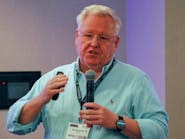COSIRI aims to boost sustainability across manufacturing
Sustainability is no longer optional, but necessary for companies, according to Raimund Klein, CEO of the Singapore-based International Centre for Industrial Transformation (INCIT). Klein, who heads the independent environmental, social and governance (ESG)-focused institution that champions global manufacturing transformation in the age of sustainability, told an audience at YNOW2024 in Houston that young consumers and next-generation workers are driving companies to act on their net-zero goals in earnest.
“Consumers drive the motivation for companies, particularly young buyers of products who will hold companies accountable,” Klein said.
Klein explained that 80% of millennials want to work for a company with a strong commitment to ESG. Meanwhile, shifting consumer expectations mean that they’ll be willing to accept a 15-30% price premium for sustainably produced products and services. Add those incentives to increased investor requirements and bolder environmental regulations around the world and the path is clear for manufacturers. However, the obstacles that remain involve knowing what a company must do to satisfy all stakeholders.
“The problem is that regulators really never defined what is ESG,” Klein said. Confusion often leaves manufacturers wondering which of the elements it most needs to address. Knowing the requirements for each component—the E, S and G—is an inexact science for manufacturers.
Framework to gauge sustainable practices
Klein’s group aims to change the dynamics for manufacturers by giving them a framework from which to work toward sustainability. The Consumer Sustainability Industry Readiness Index (COSIRI) is a comprehensive ESG framework designed to assess the sustainability maturity of companies. It is tailored specifically for manufacturers, and its applicability spans across all manufacturing industries regardless of whether the company is a small or medium-sized enterprise or a multinational corporation.
Klein pointed out that INCIT’s methodology differs from other transition models, particularly in the energy sector. “Our approach is from bottom up,” he said.
INCIT looks at the consumers first because they tend to prioritize sustainability more than manufacturers, according to Klein. Manufacturers routinely rank productivity and profitability above sustainability when creating plans and budgets. In addition, 90% of companies don’t even understand their key drivers of sustainability, Klein said.
COSIRI is used to evaluate ESG maturity levels across various dimensions of a manufacturer, including the shop floor, supply chain, logistics, strategy, risks, workforce development and leadership. Klein said the holistic approach ensures collective commitment to reducing greenhouse gas (GHG) emissions across Scopes 1, 2 and 3.
As a starting point, COSIRI measures GHG emissions for a company to gauge Scopes 1 and 2. From there, they investigate the company’s supplies to gauge Scope 3, and eventually they move to look at transportation of products and circulatory lifecycle designs.
Klein said any sustainable operation requires comprehensive management of the environmental effects throughout its operation. That means managing GHG emissions, water usage, energy usage and material waste. Circulatory design is often overlooked but the retrieval of the product at the end of its lifecycle to enable reuse or recycling is a vital component to any strategy and must be measured and reported adequately.
Collaborative effort
COSIRI is endorsed by the World Economic Forum and INCIT collaborates with governments to assess the ESG performance of key industries within their economy, pinpointing areas of weakness to make data-driven decisions and design targeted support programs to elevate them.
The group also works with trade associations to leverage granular data to analyze specific industry segments, gaining insights into the ecosystem and its supply chain.
But the heart of INCIT’s effort is its collaboration with individual companies. The goal of an assessment, Klein said, is to guide companies as to which element of ESG to focus on to become a truly sustainable practice.
Companies go through a three-day assessment period and receive a star emblem to promote their sustainability status.
The assessment looks at a company’s strategy and risk management as well as its sustainable business practices including operations, procurement, supply chain and product lifecycle. It also examines its clean technology usage and its workforce readiness to embrace and practice ESG. Finally, it looks at how companies incorporate ESG into their market communications.
At the end of the assessment, INCIT will advise companies on where their focus should turn and guide them through the next steps. When all is said and done, the company should be on its way to a truly sustainable operation and a better future.

